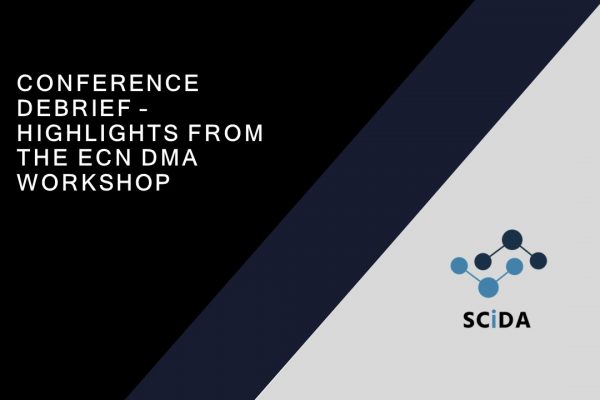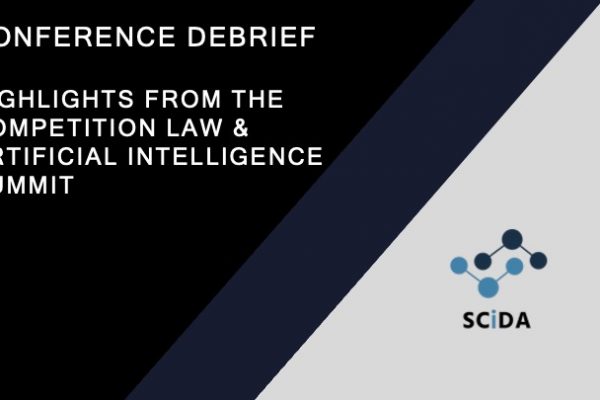SCiDA Submission to the Consultation on the 2025 DMA Review
The SCiDA Project has submitted its response to the European Commission’s consultation on the 2025 review of the Digital Markets Act (DMA). Our detailed recommendations, available at SSRN, draw on two years of comparative research analyzing digital markets regulation across the EU, UK, and Germany.
A Strong Start Requiring Bolder Action
We assess the DMA as a remarkable regulatory success. The Commission has designated seven gatekeepers and 23 core platform services and has begun meaningful enforcement work. However, the Act’s ultimate success depends on bold implementation that matches the ambition of its original design. Half-measures risk allowing digital gatekeeping to evolve beyond regulatory reach, making decisive action essential for preserving competitive digital markets and European technological sovereignty.

Summary of SCiDA Team’s 29 Recommendations
List of Core Platform Services and designation of gatekeepers
- Broaden the designation scope beyond intermediation services: Article 3(1)(b) should be revised to read as follows: “it provides a core platform service which is either an important gateway for business users to reach end users, or directly reaches business and/or end users; and”.
- Add a new core platform service (CPS) category: The DMA can introduce “AI services” as a new CPS under Article 2(2)(k) and define it in Article 2(34) as follows: “AI services” means digital services provided by AI systems as defined in Article 3, point (1), of Directive (EU) 2024/1689, (AI Act).
- Enforce designation of cloud computational services under Article 2(2)(i): Given the market concentration among providers such as AWS, Azure, and Google Cloud, and the central role of cloud infrastructure in enabling a wide range of digital services, the Commission should designate these services as CPSs under Article 2(2)(i), without being limited by the definition of business users in Annex E of the DMA.
- More flexibility in the designation list: If the Commission were to introduce greater flexibility into the designation procedure, this would constitute a broader structural reform, aligning the DMA’s logic more closely with the approach under the UK’s DMCCA, which allows the designation of any large undertaking engaged in any digital activities.
- Improve the analytical framework for CPS designation: The Commission should merely clarify that various services provided within a gatekeeper’s platform fall within the CPS categories set out in Article 2(2). Rather than attempting to draw rigid boundaries between overlapping or integrated services, the Commission should recognize that gatekeepers increasingly integrate multiple services within their platforms.
- Provide guidance on the ecosystem concept: The Commission should issue guidelines on the definition and scope of the “ecosystem” concept, ensuring a consistent application across cases, particularly regarding the assessment conducted under Articles 3(5) or (8) DMA.
Obligations
- Prohibit circumvention of obligation interpretation: The anti-circumvention rule extends to evasive interpretations of the compliance obligations by gatekeepers and should be strictly enforced in such a way. Systematic delaying and evading tactics should be sanctioned.
- Strengthen merger control: The Commission’s jurisdiction (in the interplay with national authorities) should be broadened to ensure that all transactions involving a gatekeeper are subject to merger control.
- Impose obligations for AI gatekeepers: The Commission should investigate potential abuse or overextension of gatekeepers’ power in AI markets, with particular attention to compliance with Articles 5(2), 6(3), 6(5), 6(9), 6(10) and 6(11).
- Improve FRAND access to search data under Article 6(11): The Commission should investigate certain conditions under Google’s “European Search Dataset Licensing Program”, which categorically and disproportionately limit the scope of the obligation under Article 6(11), thereby circumventing its very essence and mission.
- Clarify the technological approach to FRAND Conditions under Article 6(12): The term “conditions” under this provision should be understood broadly, extending beyond fee structures and standard written terms and conditions to encompass the “entire package of rights, obligations and requirements imposed on business users” which would, for example, include conditions of how an offer of a business user is presented on the CPS.
- Set compliance priorities: The Commission should set priorities for gatekeepers what are the most pressing issues that require particular attention.
- Monitor predatory pricing behaviour: The Commission should establish mechanisms to identify and assess instances where gatekeepers price core platform services below cost without clear efficiency justifications.

Enforcement
- Clarify and strengthen the position of stakeholders: The Commission should invest resources in amplifying stakeholder voices and should adopt a more proactive enforcement posture.
- Clarify the role of negotiation: Compliance dialogues should be designed to drive gatekeepers to comply properly. They must follow a strict procedure with clear timelines and not be subject to delaying and evading tactics. For the Commission, negotiations aim at establishing the basis for non-compliance-decisions.
- Redefine the role of the Commission: The Commission should employ the one-for-all-principle byprioritising a single, well-reasoned enforcement decision for each obligation. By setting out clear decisions early on, the Commission can establish a strong and consistent foundation for future enforcement, thereby clarifying general expectations for both gatekeepers and business users.
- Empower national authorities to enforce non-compliance: A serious commitment to decentralised enforcement should be considered, drawing on the transformation achieved under the EU competition law framework.
- Encourage private enforcement: Private enforcement should be promoted as a complementary mechanism to public enforcement.
- Establish a testing lab: A testing lab within national agencies or the Commission could be established to trial proposed remedies and assess their real-life-impact.
Implementing Regulation and Procedure
- Steer towards systematic non-compliance investigations: Where ecosystems by their very design and structure corrupt the decision-making process and block fairness and contestability, proportionate remedies must be structural in nature. The Commission should therefore steer towards systematic non-compliance investigations, that enable the Commission to take structural measures.
- Enhance stakeholder-driven procedures: The process of DMA enforcement must be stakeholder-driven. The position of third parties in the DMA should be strengthened. Sufficient protections should be ensured to protect business users who act as informants, including the possibility to report anonymously through the whistleblower tool in a secure and effective manner.
- Avoid faux commitments: Investigations should not be terminated merely because a gatekeeper voluntarily adjusts its behaviour after the opening of a non-compliance investigation. Such “faux commitments” risk undermining the credibility and deterrent effect of the DMA.
- See investigations through to conclusion: Once a non-compliance investigation is opened, it should be seen through to its conclusion on the basis of the behaviour as it was at the time the investigation was opened.
Effectiveness and impact on business users and end users of the DMA
- Transparency and disclosure of interests: The Commission should require transparency and disclosure from academics and stakeholders, also by asking gatekeepers for funding of stakeholders and academics.
- Grant access to full compliance reports: Certain stakeholders and independent researchers should be granted access to full compliance reports, including confidential information, subject to appropriate safeguards, as indicated under Article 40 of the Digital Services Act.
- Enable independent review: Independent third parties or research institutions/groups should be authorised or funded to conduct thorough assessments of gatekeepers’ compliance reports under Article 11 of the DMA.
- Take enforcement action: Where the assessments reveal that compliance reports are insufficient or ineffective, the Commission should take enforcement action under Article 11.
- Develop long-term criteria for effectiveness: The criteria for assessing the impact and effectiveness of the DMA should be framed in a long-term and strategic perspective.
- Interpret the DMA in context: The DMA should be interpreted in close interplay with other rules and see the bigger picture, ensuring that the digital world aligns with European values and broader policy objectives.

Supporting the Commission’s Mission
We acknowledge the enormous challenges faced by the DMA Team—both the significant responsibility inherent in enforcing the DMA and the political pressures. The SCiDA Team remains fully supportive of the strategic efforts and approaches of the Commission to shape competition in European digital markets, thereby contributing to the broader development of these markets themselves.
Our full consultation response provides extensive analysis across all aspects of DMA implementation, including detailed recommendations on designation procedures, obligation interpretation, merger control, and procedural frameworks. We offer concrete guidance for consistent application of the ecosystem concept, improved analytical frameworks for core platform service designation, and mechanisms to ensure the DMA adapts to rapidly evolving digital markets.
Read our full consultation response: Consultation on the 2025 Review of the Digital Markets Act (DMA)
Explore our research: www.scidaproject.com





